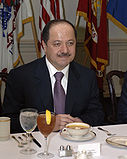1992 Kurdistan Region parliamentary election
| |||||||||||||||||||||||||
Total of 105 seats of the Kurdistan National Assembly 53 seats were needed for a majority | |||||||||||||||||||||||||
|---|---|---|---|---|---|---|---|---|---|---|---|---|---|---|---|---|---|---|---|---|---|---|---|---|---|
| |||||||||||||||||||||||||
 Map showing areas where the PUK won a majority in green and were the KDP won a majority in Yellow | |||||||||||||||||||||||||
| |||||||||||||||||||||||||
On 19 May 1992 elections were held to the Kurdistan National Assembly, the parliament of the Kurdistan Region in Iraq. At the time, the National Assembly had 105 seats, of which 5 were reserved for the Assyrian community. Parties had to achieve more than 7% of the vote to be elected. There were 178 polling stations around the region.[1]
The election resulted in a narrow victory for the Kurdish Democratic Party, which won 51 seats, its main rival, the Patriotic Union of Kurdistan's Alliance won 49 seats. However, due to fraud allegations KDP gave up one seat to the PUK so that each would have 50 seats, they proceeded to form a unity government which lasted until May 1994, when the Kurdish Civil War broke out.
On 4 June 1992, KDP Secretary General Jawhar Namiq Salim was elected Speaker of the Kurdistan National Assembly and prominent PUK member Fuad Masum was elected Prime Minister of Kurdistan Region.
Results
| Electoral Alliance | Votes | Seats | Leaders | |
|---|---|---|---|---|
| Total count | Percent | |||
| Kurdistan Democratic Party | 437,879 | 45.3% | 51 | Masoud Barzani |
| Patriotic Union of Kurdistan1 | 423,833 | 43.8% | 49 | Jalal Talabani |
| Islamic Movement of Kurdistan | 49,108 | 5.1% | 0 | Osman Abdulaziz |
| Kurdistan Socialist Democratic Party | 24,882 | 2.6% | 0 | Mahmoud Othman |
| Iraqi Communist Party | 21,123 | 2.2% | 0 | Aziz Muhammad |
| Kurdistan Popular Democratic Party | 9,903 | 1.0% | 0 | |
| Independent Democrats | 501 | — | 0 | |
| Valid votes cast | 967,229 | 99.9% | ||
| Invalid votes | 4,724 | 0.1% | ||
| Total votes cast | 971,953 | 100% | 100 | Source |
| Assyrian Parties | Votes | Seats | Leaders | |
|---|---|---|---|---|
| Total count | Percent | |||
| Assyrian Democratic Movement | 6,543 | 54% | 4 | Yonadam Kanna |
| Kurdistan Christian Unity | 2,757 | 23% | 1 | Sarkis Aghajan |
| Khaldu-Ashur Communist Party | 2,134 | 18% | - | |
| Democratic Christians | 537 | 5% | - | |
Governorate breakdown
Dahuk Governorate
| Party | Total votes | Percentage |
|---|---|---|
| Kurdistan Democratic Party | 168,683 | 85.46% |
| Patriotic Union of Kurdistan | 15,184 | 7.69% |
| Kurdistan Popular Democratic Party | 6,051 | 3.07% |
| Islamic Movement of Kurdistan | 3,874 | 1.96% |
| Kurdistan Socialist Party | 1,983 | 1.01% |
| Iraqi Communist Party | 1,546 | 0.78% |
| Other | 49 | 0.03% |
| Total | 197,370 | 100% |
Note: Dahuk included the Aqrah and Shekhan Districts which were officially part of Nineveh Governorate.
Erbil Governorate
| Party | Total votes | Percentage |
|---|---|---|
| Kurdistan Democratic Party | 152,143 | 45.58% |
| Patriotic Union of Kurdistan | 148,352 | 44.44% |
| Islamic Movement of Kurdistan | 11,092 | 3.32% |
| Iraqi Communist Party | 11,047 | 3.31% |
| Kurdistan Socialist Party | 8,883 | 2.66% |
| Kurdistan Popular Democratic Party | 2,101 | 0.63% |
| Other | 184 | 0.15% |
| Total | 333,802 | 100% |
Note: The Makhmour district was at this time still under control of the Iraqi government, no elections were held there.
As Sulaymaniya Governorate
| Party | Total votes | |
|---|---|---|
| Patriotic Union of Kurdistan | 207,168 | 59.54% |
| Kurdistan Democratic Party | 92,449 | 26.57% |
| Islamic Movement of Kurdistan | 29,334 | 8.43% |
| Kurdistan Socialist Party | 11,978 | 3.44% |
| Iraqi Communist Party | 5,693 | 1.64% |
| Kurdistan Popular Democratic Party | 1,118 | 0.32% |
| Other | 213 | 0.06% |
| Total | 347,953 | 100% |
Diyala Governorate
| Party | Total votes | Percentage |
|---|---|---|
| Patriotic Union of Kurdistan | 53,129 | 60.28% |
| Kurdistan Democratic Party | 24,604 | 27.92% |
| Islamic Movement of Kurdistan | 4,808 | 5.46% |
| Iraqi Communist Party | 2,837 | 3.22% |
| Kurdistan Socialist Party | 2,038 | 2.31% |
| Kurdistan Popular Democratic Party | 663 | 0.75% |
| Other | 55 | 0.62% |
| Total | 88,134 | 100% |
Only two areas in the Diyala Governorate were under Kurdish control: Darbandikhan and Khanaqin.
References
- ^ Iraqi Kurdistan Political Development and Emergent Democracy By Gareth R V Stansfield, Inc NetLibrary. page 129.
External links
- Kurdistan National Assembly Parliament
- https://web.archive.org/web/20091026140537/http://geocities.com/capitolhill/congress/1154/parl.htm


